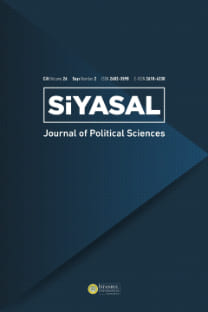Kalkınma İktisadında Temel İhtiyaçlar Etiği Yaklaşımı
1970'li yıllardan itibaren pek çok uluslararası kuruluş, politikacı ve akademisyen, kalkınma iktisadının asıl amacının temel insan ihtiyaçlarının nasıl giderileceğine ilişkin politika önerilerinde bulunmak olduğunu öne sürmüşlerdir. Bu amacın evrenselliği konusunda bir uzlaşma söz konusu olsa da, temel insan ihtiyaçlarının tanım ve kapsamı konusunda görüş birliği doğmamıştır. Ancak, 1990’lı yıllardan itibaren temel ihtiyaçlar etiği yaklaşımı altında, pek çok sosyal bilimci, yerel farklılıkları da gözeterek temel insan ihtiyaçlarının genelliğini ve evrenselliğini ortaya koymuşlar ve temel insan ihtiyaçlarını çeşitli felsefi gelenekler çerçevesinde yeniden tanımlamışlardır. Çalışmamızda, temel ihtiyaçlar etiği yaklaşımının incelenmesi ve bu yaklaşımın kalkınma sürecindeki öneminin ortaya konulması amaçlanmıştır.
The Approach of Basic Human Needs Ethics in Development Economics
From 1970’s, many international institutions, politicians and academicians have been arguing that the central purpose of development economics should be making policy recommendations concerning the way in which the basic needs can be satisfied. While there is an agreement on the universality of this purpose of development economics on the one hand, there does not appear to be an agreement on the definition of basic human needs. In this paper, it is aimed to point out the importance of the “basic human needs ethics” approach in explaining human needs and development process by discussing it with reference to some philosophical traditions.
___
- •Benhabib, S. (1995), "Cultural Complexity, Moral Interdependence, and the Global Dialogical Community", M.Nussbaum ve J.Glover (der)., Woman, Culture and Development: A Study of Human Capabilities içinde. Clarendon Press, Oxford: 234-255
- •Bulutay, T. (2002), In the Context of Strengtheneign the Capacity in National Accounts Project Implemented together with UNDP and SIS: The New Developments in National Accounts, DİE Yayınlan: Ankara
- •Cohen, G.A. (1993), "Equality of What? On Welfare Goods and Capabilities" M.Nussbaum ve A. Sen, The Quality of Life içinde. Clarendon Press, Oxford: 2-29.
- •Crocker. D. (1991), "Towards Development Ethics", World Development, 19, 457-83.
- •Crocker, D. (1992), "Functionings and Capability: The Foundations of Sen's and Nussbaum's Development Ethic", Political Theory, 20, 584-612.
- •Çakmak-Karaçay, H. (2003), "Kalkınma İktisadı Literatüründe Gelişme Kavramının Evrimi", Hacettepe Üniversitesi, İİBF Dergisi, 21(2), 49-68
- •Elwan, A. (1999), "Poverty and Disability: A Survey of Literature", Social Protection Discussion Paper, No:9932, World Bank: Washington, DC.
- •Ercan, F. (2001), Modernimi, Kapitalizm ve Azgelişmişlik, Bağlam Yayınlan: istanbul
- •Erikson, R. (1993), "Descriptions of Inequality: The Swedish Approaches to Welfare Research", M.Nussbaum ve A. Sen, The Quality of Life içinde. Clarendon Press, Oxford: 67-84.
- •Gaertner, W. (1993), "Amarta Sen: Capability and Well-Being" M.Nussbaum ve A. Sen, The Quality of Life içinde. Clarendon Press, Oxford: 62-66.
- •Gasper, D. (1996), "Culture and Development Ethics: Needs, Women's Rights, and Western Theories", Development and Change, 27(4): 627-661.
- •Glover, J. (1995), " The Research Programme of Development Ethics", Nussbaum, M. ve J. Glover (der"), Woman, Culture and Development: A Study of Human Capabilities içinde, Clarendon Press, Oxford: 116-139.
- •Goldia, I. ve L.A Winters (1995), "Economic Policies for Sustainable Development", Goldin I ve L.A. Winters (der).. The Economics of Sustainable Developmentiçinde. Canbridge University Press, Cambridge: 1-15.
- •Gökberk, M. (1994), Felsefe Tarihi, Remzi Kitabevi: İstanbul
- •Ingham, B. (1993), "The Meaning of Development: Interactions Between "New" and "Old" Ideas", World Development, 21: 1802-1821.
- •Korsgaard, CM. (1993), " G.A Cohen: Equality of What? A.Sen: Capability and Well-Being", M.Nussbaum ve A.Sen, The Quality of Life içinde. Clarendon Press, Oxford: 54-61.
- •Kuçuradi, I. (1988), Uludağ Konuşmaları: Özgürlük, Ahlak ve Kültür Kavramları, Türkiye Felsefe Kurumu Yayınları: Ankara
- •Kuçuradi, I. (1998), İnsan ve Değerleri, Türkiye Felsefe Kurumu Yayınları: Ankara.
- •Nussbaum, M. (1992), "Human Functioning and Social Justice: In Defense of Aristotelian Essentialism", Political Theory, 20, 202-46.
- •Nussbaum, M ve A.Sen (1993), The Quality of Life, Clarendon Press: Oxford.
- •Nussbaum, M. ve J. Glover (1995), Woman, Culture and Development: A Study of Human Capabilities, Clarendon Press: Oxford.
- •O'Neill, O.(1995), "Justice, Capabilities, and Vulnerabilities", Nussbaum, M. ve J.Glover (der.), Woman, Culture and Development: A Study of Human Capabilities içinde, Clarendon Press, Oxford: 140-152.
- •Sen, A. (1983), "Development: Which Way Now?", Economic Journal, 93: 495-502.
- •Sen, A. (1985), Commodities and Capabilities. North Holland: Amsterdam.
- •Sen, A. (1993), "Capability and Weil-Being," M.Nussbaum ve A.Sen The Quality of Life içinde. Clarendon Press, Oxford:30-53.
- •Sen, A. (1995), " Gender Inequality and Theories of Justice", Nussbaum, M. ve J. Glover (der.), Woman, Culture and Development: A Study of Human Capabilities içinde, Clarendon Press, Oxford: 259-73.
- •Streeten P. (1981), First Things First Meeting Basic Human Needs in the Developing Countries, World Bank: New York
- •UNDP (2001), Human Development Report, 2001, Making New Technologies Work for Human Development, Oxford University Press: New York.
- ISSN: 1303-1260
- Yayın Aralığı: Yılda 2 Sayı
- Yayıncı: İstanbul Üniversitesi
Sayıdaki Diğer Makaleler
Küresel Bir Sorun Olarak İklim Değişikliği ve İklim Politikaları
Parlamenter Rolleri ve TBMM'de Parlamenter Davranışları Üzerine Bir Alan Araştırması
Kalkınma İktisadında Temel İhtiyaçlar Etiği Yaklaşımı
Avrupa Güvenlik ve Savunma Sisteminde Nato'nun Dışlanma Olasılığına Hukuksal Bir Bakış
Yaşlı Tüketicilerin ve Satın Alma Davranışlarının İncelenmesine Yönelik Bir Araştırma
Türkiye'de Yaşayan Ermenilerin "12 Eylül" Algılaması
